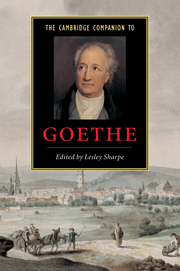Book contents
- Frontmatter
- Introduction
- 1 The world Goethe lived in
- 2 Goethe the writer and literary history
- 3 Goethe the poet
- 4 Goethe the dramatist
- 5 Faust
- 6 Weimar Classicism
- 7 Goethe and the Weimar theatre
- 8 Goethe’s prose fiction
- 9 Autobiographical writings
- 10 In defence of experience
- 11 Goethe and gender
- 12 Goethe and the visual arts
- 13 Goethe and the political world
- 14 Religion and philosophy
- 15 Reception in Germany and abroad
- A guide to further reading
- Index
2 - Goethe the writer and literary history
Published online by Cambridge University Press: 28 May 2006
- Frontmatter
- Introduction
- 1 The world Goethe lived in
- 2 Goethe the writer and literary history
- 3 Goethe the poet
- 4 Goethe the dramatist
- 5 Faust
- 6 Weimar Classicism
- 7 Goethe and the Weimar theatre
- 8 Goethe’s prose fiction
- 9 Autobiographical writings
- 10 In defence of experience
- 11 Goethe and gender
- 12 Goethe and the visual arts
- 13 Goethe and the political world
- 14 Religion and philosophy
- 15 Reception in Germany and abroad
- A guide to further reading
- Index
Summary
Even aged sixteen Goethe strove for authority. He may not have achieved the sublime degree of autoritas he envisaged as a Leipzig fresher in 1765 - that of a German university professor. But among his peers he quickly acquired unparalleled poetic authority. After the publication of his first major innovative works, the Shakespearean patriotic drama Götz von Berlichingen (1773) and the Rousseauesque sentimental novel Die Leiden des jungen Werther (The Sorrows of Young Werther, 1774), Goethe was lionized. In his Pandaemonium Germanicum (c. 1775) Jakob Michael Reinhold Lenz portrayed Goethe atop the German Pantheon, surrounded by adoring critics whom he must shake off like flies. Johann Caspar Lavater's Physiognomische Fragmente (Physiognomical fragments, 1775-8) presented Goethe for page after page as a divine poetic genius. This poetic charisma remained undiminished as generations and literary paradigms passed. Twenty years on, in Über die asthetische Erziehung des Menschen (On the Aesthetic Education of Humanity, 1795), Friedrich Schiller painted Goethe's portrait as the model classical poet. Such admiration also stretched across literary ideologies. In 1798 the leading early German Romantic Friedrich Schlegel asserted that Goethe's classical novel Wilhelm Meisters Lehrjahre (Wilhelm Meister's Apprenticeship, 1795-6) represented one of the age's three fundamental tendencies).
- Type
- Chapter
- Information
- The Cambridge Companion to Goethe , pp. 23 - 41Publisher: Cambridge University PressPrint publication year: 2002



